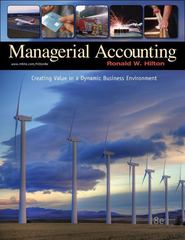Question
It is January 10, 2020, and you are employed by Louis Consulting Group (LCG), a mid-sized accounting consulting firm. You have been assigned to review
It is January 10, 2020, and you are employed by Louis Consulting Group ("LCG"), a mid-sized accounting consulting firm. You have been assigned to review and analyze the below provided your client's information, Crown Development Incorporated ("CDI"), and to make a memo to its board of directors ("board") and management addressing all significant accounting issues. In doing so, your manager, Steven, asked you to include complete discussions of accounting issues, analysis, recommendations, implications, and adjusting journal entries where applicable.
CDI is a local developer specialized in small- and medium-sized commercial and residential real estate development. Since incorporated in 1995, its business has been stable, and experienced steady-growth. Don and Sam, the co-founders of CDI, each own 50% of the company, and have been actively managing the business. The board consists of the two shareholders and two other inside directors. No change in ownership structure is expected in the foreseeable future as both Don and Sam are satisfied with their business as is.
In late 2019, the bank required an annual financial statement for CDI's fiscal year-ended December 31, 2019 in accordance with IFRS, to reassess CDI's ability to repay the outstanding loan. The bank was particularly concerned about CDI's potential breach of the debt covenant (i.e. to maintain Debt-to-Equity ratio of 2 or below, and to generate positive comprehensive income) given the deteriorated market conditions. Don explained that it is crucial to meet the covenants as the loan will become payable on demand otherwise. He noted that he worked closely with the controller to ensure that transactions are recorded in a favorable manner.
One of CDI's main suppliers, Help Developers Inc ("HDI"), experienced severe financial difficulties in 2019. To support its business, CDI agreed to pay $200,000 in exchange for 20% of HDI's outstanding common shares. Don explained that it is a way to provide financial support as its survival is directly linked to CDI's success. The remaining shares are owned by the owner of HDI, Jay, who makes all the strategic and operating decisions. No board seats are given to CDI as CDI does not plan to participate in any policy- or decision- making processes. In fact, it is clearly stipulated in the shareholders' agreement that all decisions including dividend or other distributions are to be made solely by Jay. Don and the controller agreed that the equity method must be used to account for the investment in HDI because it meets the 20% threshold. Accordingly, the following entries were recorded in 2019. Assume that the fair value of HDI's shares are not readily available.
Dr. Investment in associate (HDI, Equity method)$200,000
Cr. Cash$200,000
Re: To record purchase of HDI shares
Dr. Investment in associate (HDI, Equity method)$20,000
Cr. Equity Income (20% * $100,000)$20,000
Re: To record equity income, 20% of HDI's net income of $100,000
CDI bought a patent in December 2017 to protect CDI's state-of-the-art real estate technology, with a forecast of profits related to the patent. CDI bought the patent for $3,000,000, and have been amortizing it using the straight-line method over its 15-year remaining useful life. As a result of new competing technology on the market, CDI experienced a declining customer base over the last two years. Given that, CDI adjusted its forecast of profits as follows.
Discounted future cash flows:$2,000,000
Undiscounted future cash flows:$2,800,000
Fair value:$2,200,000
Cost of disposal:$0
CDI recorded correct amount of amortization expenses up to and including 2019, but no impairment test was conducted. Don argued that "no impairment test is required unless there is indication that the carrying amount may not be recoverable!"
In 2019, a local government has provided CDI with a one-time grant of $500,000 as part of the Affordable Housing Initiative. The grant is intended specifically for the purchase of a residential building within a specified zone. Accordingly, CDI purchased a building, to satisfy the condition, at $2,500,000 in late December 2019. The estimated useful life of the building is 10-year, and CDI recorded the following entries.
Dr. Cash$500,000
Cr. Revenue - government grant$500,000
Dr. Building$2,500,000
Cr. Cash$2,500,000
Required
Do a memoincluding complete discussions of accounting issues, analysis, recommendations, implications, and adjusting journal entries where applicable
Step by Step Solution
There are 3 Steps involved in it
Step: 1

Get Instant Access to Expert-Tailored Solutions
See step-by-step solutions with expert insights and AI powered tools for academic success
Step: 2

Step: 3

Ace Your Homework with AI
Get the answers you need in no time with our AI-driven, step-by-step assistance
Get Started


